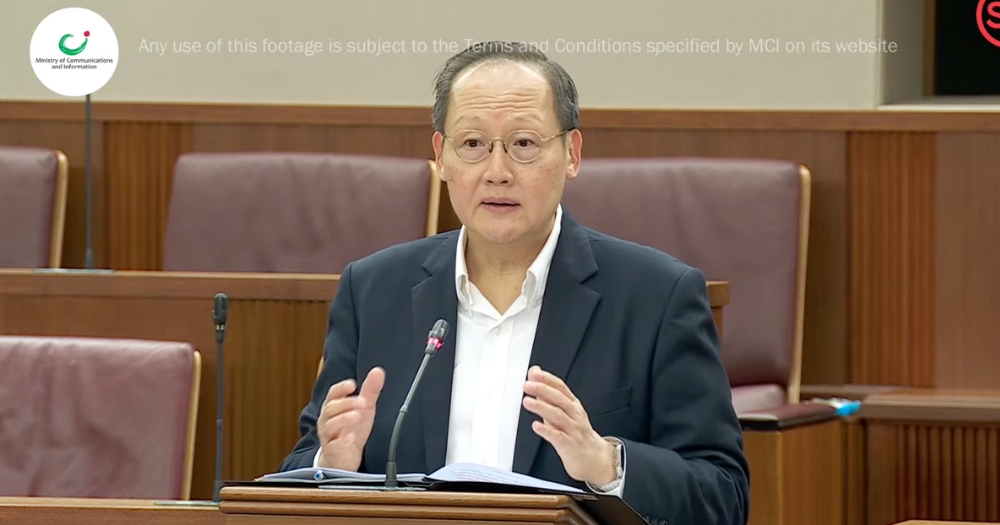Follow us on Telegram for the latest updates: https://t.me/mothershipsg
In his speech in Parliament on Jan. 9, Minister for Manpower and Second Minister for Trade and Industry Tan See Leng explained the Manpower for Strategic Economic Priorities (M-SEP) policy and fielded questions from Members of Parliament (MPs).
What is M-SEP?
Tan announced the M-SEP scheme in his speech during the Committee of Supply debates in March 2022.
Under the scheme, firms can temporarily hire S Pass and Work Permit holders above the prevailing Dependency Ratio Ceiling (DRC) and S Pass sub-DRC.
These firms can obtain additional S Pass and Work Permit quotas of up to 5 per cent above their base workforce headcount, which is capped at 50 workers per firm, for up to two years from their enrolment into the scheme, where they can choose to renew thereafter.
However, these firms must satisfy two conditions in order to qualify for the scheme.
Firstly, these firms must participate in programmes or activities in line with any one of the three key economic priorities – investments which support Singapore’s hub strategy, innovation or research and development (R&D), or internationalisation.
Next, these firms must also commit to hiring and/or training Singaporeans.
No U-turn to one-third foreign manpower policy
Workers' Party MP Leon Perera posed a supplementary question to Tan, asking if the M-SEP scheme, which raises the foreign worker quota for eligible firms, will result in a breach in the government's one-third foreign manpower policy.
Noting that the government has previously taken the view that no U-turns will be made to the foreign manpower policy, Perera also asked Tan how is the government planning to make it clear to Singapore's businesses that they are not wavering from their stance with the M-SEP scheme.
In response, Tan said the capping of foreign manpower to one-third is a function of the needs of the economy, adding that the M-SEP scheme does not indicate that the government is U-turning on its foreign manpower policy.
He said the M-SEP scheme was conceived to capture "this very, very tight space" of the three specific economic priorities such that Singapore can continue to pivot and transform in a "rapidly evolving, rapidly disrupting world".
As the government continues to persuade companies to automate and improve, the M-SEP scheme is a stopgap measure to help "a very highly selected group of companies ... on the cusp of being able to make that significant pivot and to help just give them the uplift that's necessary".
Tan went on and stressed that the M-SEP scheme is "very tightly scripted" in its conditions and "very highly selective and differentiated" for the selected companies.
No U-turn to one-third foreign manpower policy
Progress Singapore Party's Non Constituency MP Leong Mun Wai followed up to Perera's question, claiming that Tan did not clarify whether the government is U-turning on its foreign manpower policy.
Leong said: "You haven't answered our fellow member Leon's question on whether it's a U-turn or not. You said you have to check the past information, where in the past there was a 33 per cent cap on foreigners. [But] if you say that that is not necessarily the ratio now, that in fact is a U-turn, right?"
In response, Tan said that Leong did not capture the essence of what Tan was trying to say, saying that "it was strange" as Perera who posed the initial question "did not have an issue" after Tan's reply.
Tan added that the government will not only follow the one-third ratio, but also closely monitor how the M-SEP scheme will affect that ratio by raising the sub-DRC numbers and the work permit numbers above the prevailing quota.
However, Tan does not expect the M-SEP scheme to "affect the proportion" due to the very highly selective nature of the scheme, and because of the stringent condition one and condition two criteria that firms have to meet.
Related story
Top image screenshot from Ministry of Communications and Information/YouTube
If you like what you read, follow us on Facebook, Instagram, Twitter and Telegram to get the latest updates.
